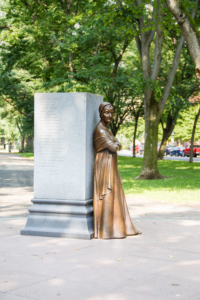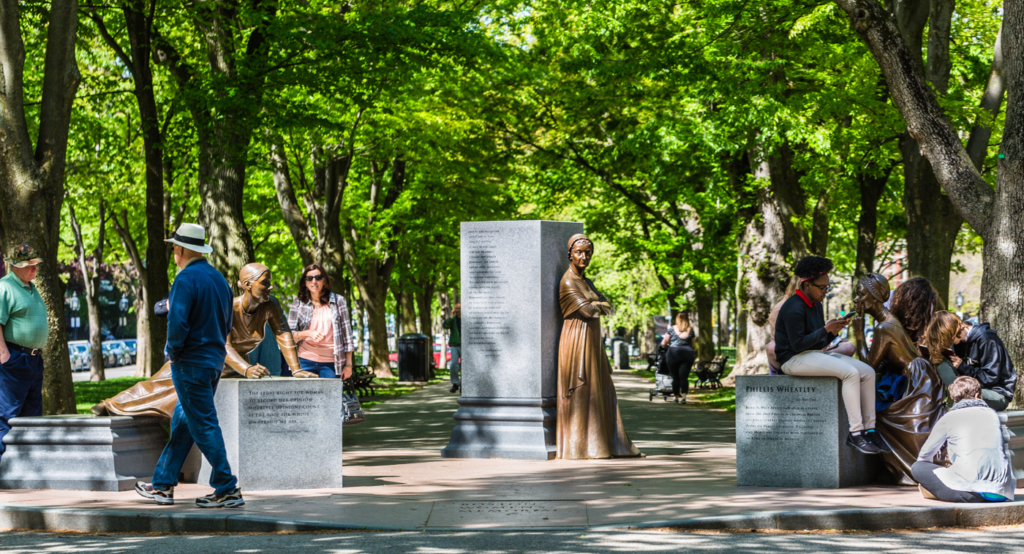Abigail Adams is one of three women celebrated at the Boston Women’s Memorial on the Commonwealth Avenue Mall. The three share a Boston connection, a place in national history, and a passion for social justice.
Abigail Adams (1744-1818) may be best known as the wife of the second president of the United States, John Adams, and mother of the sixth, John Quincy Adams. But she was also an early advocate for women’s rights and a vital confidant and advisor to her husband. She actively opposed slavery, advocated for abolition, and supported women’s education.
 Born to a prominent family in Weymouth, Adams was the daughter of the Reverend William Smith, part of a prestigious ministerial community in the Congregational Church. Like other women of the time, Abigail had no formal education, but she made use of her family’s large library to master subjects most women never considered learning.
Born to a prominent family in Weymouth, Adams was the daughter of the Reverend William Smith, part of a prestigious ministerial community in the Congregational Church. Like other women of the time, Abigail had no formal education, but she made use of her family’s large library to master subjects most women never considered learning.
She married John Adams at the beginning of his law career, after his graduation from Harvard College. Even during their courtship, the couple spent long periods apart and relied upon letter writing to keep in touch. After their marriage, they moved to Braintree, where Abigail managed their farm and business affairs while raising their five children. Her husband traveled regularly as a lawyer, political revolutionary, and, after independence, a diplomat. Women had limited property rights during this era, but Abigail proved to be exceptionally capable of managing the family’s finances and household.
In 1768, the family moved to Boston proper, and they became a part of a social circle that included patriots like John’s cousin Samuel Adams, John Hancock, James Otis, and Joseph Warren. After the Boston Massacre in 1770, Abigail supported her husband’s controversial choice to defend the British soldiers.
In 1774, Abigail remained in Braintree to manage the farm, while her husband went to Philadelphia as a delegate to the First Continental Congress. Their correspondence took on greater importance as Abigail reported about British and American military confrontations. She took her son John Quincy to the top of Penn’s Hill near their farm to witness the Battle of Bunker Hill in 1775. An ardent supporter of American independence, Abigail wrote, “A people may let a king fall, yet still remain a people: but if a king lets his people slip from him, he is no longer a king. And this is most certainly our case, why not proclaim to the world in decisive terms, your own independence?”
Her letters of that time showed a vision of independence that was broader and more progressive than that of the writers of the Declaration of Independence. She believed all people, and both sexes, should be granted equal rights. She wrote, “I wish most sincerely that there was not a slave in the province. It always seemed to me to fight ourselves for what we are robbing the Negroes of, who have as good a right to freedom as we have.”
One of her best-known quotes was in a letter to John, where she encouraged his fellow delegates to “remember the ladies, and be more generous and favorable to them than your ancestors” when they drafted new laws. In the end, the Continental Congress failed to guarantee the rights of blacks or women in the Declaration of Independence.
While her husband was a diplomat in France, Abigail continued to run the farm. In 1784, she joined her husband and son and spent four years in Europe as John served as Minister to Great Britain. In 1789, John Adams was elected first Vice President of the United States. Over the next twelve years, he served two terms as Vice President (1789-1797) and one term as President (1797-1801), When he was elected president in 1797, Adams eagerly wrote to his wife, “I never wanted your advice and assistance more in my life …”
An outspoken First Lady, Adams often defended her husband’s positions, including his advocacy of the controversial Alien and Sedition Acts (1798). Adams’ courageous yet unpopular stand led to his failure to be reelected in 1800, but he was proud to have prevented war.. At the end of his presidency, John and Abigail became the first occupants of the Executive Mansion in Washington, D.C. (today, the White House). In 1801, John and Abigail retired to Massachusetts,and she focused on her home and the advancement of her son John Quincy’s career. In the fall of 1818, Abigail contracted typhoid fever, and she died on October 28 surrounded by her family.
Her legacy survives in the voluminous correspondence she carried on with her husband and others throughout her life. John consistently sought her advice and their letters contain intellectual discussions about politics and government, as well as eyewitness accounts of the Revolutionary War. Historian Joseph Ellis found that the 1,200 letters between John and Abigail “constituted a treasure trove of unexpected intimacy and candor, more revealing than any other correspondence between a prominent American husband and wife in American history.”
You can visit Abigail and the other historic women featured in the Boston Women’s Memorial on the F-G block of Commonwealth Avenue Mall, between Fairfield and Gloucester Streets.


